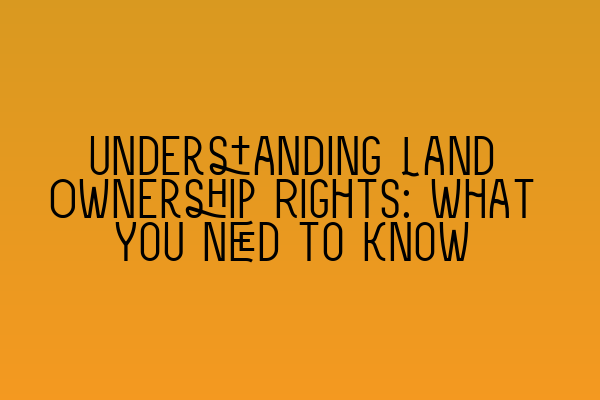Understanding Land Ownership Rights: What You Need to Know
As a solicitor at SQE Property Law & Land Law, it is important to have a comprehensive understanding of land ownership rights. Whether you are a buyer, seller, or involved in any land-related transaction, having a clear knowledge of these rights is crucial for a successful outcome. In this blog post, we will explore the various aspects of land ownership rights that you need to know.
Types of Land Ownership
There are different types of land ownership, and it is essential to distinguish between them to understand the rights associated with each type. The most common types include:
Freehold
Freehold ownership refers to owning the land and any buildings on it outright. This type of ownership offers the highest level of control and freedom, as the owner has the right to use, modify, and transfer ownership of the land without any restrictions, subject to applicable laws and regulations. If you are interested in acquiring freehold property, you can learn more about it here.
Leasehold
Leasehold ownership allows individuals to own a property for a fixed period, typically for long-term leases ranging from 99 to 999 years. However, the land still belongs to the freehold owner, known as the landlord. While leasehold owners have the right to use and enjoy the property during the lease period, they must adhere to certain terms and conditions outlined in the lease agreement. To gain a better understanding of leasehold ownership, click here.
Rights and Responsibilities
When it comes to land ownership, it’s essential to comprehend the rights and responsibilities associated with it. These include:
Right to Use and Enjoy the Land
As a landowner, you have the right to use and enjoy your land within the constraints of applicable laws and regulations. This includes the right to build structures, plant trees, and engage in other activities that do not infringe upon the rights of others.
Right to Exclude Others
Landowners have the right to prevent others from entering or using their land without permission. However, there are certain situations where individuals may have the right to access the land, such as utility companies and government authorities carrying out their duties.
Responsibility for Maintenance
Landowners are responsible for maintaining their property, ensuring that it is in a safe and habitable condition. This includes repairing any damages and addressing potential hazards that may cause harm to others or neighboring properties.
Transferring Land Ownership
Transferring land ownership requires careful consideration of legal processes and requirements. One common method of transferring ownership is through conveyancing, which involves the transfer of legal title from one party to another. If you are involved in a property transaction and need assistance with the transfer process, our team at SQE Property Law & Land Law can provide the expertise you need.
If you are preparing for your SQE 1 or SQE 2 exams, we offer comprehensive preparation courses to help you succeed. Visit our website to learn more about our SQE 2 preparation courses and SQE 1 preparation courses.
Conclusion
Understanding land ownership rights is crucial for anyone involved in land-related transactions or disputes. Whether you are a buyer, seller, or an aspiring solicitor, having a solid grasp of these rights will enable you to navigate the complexities of property law effectively. If you have any further questions or require legal assistance, do not hesitate to contact SQE Property Law & Land Law for expert advice.
